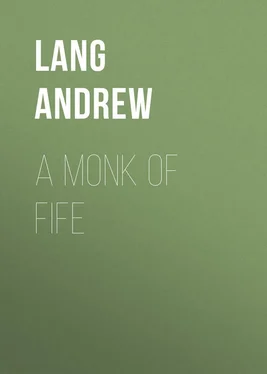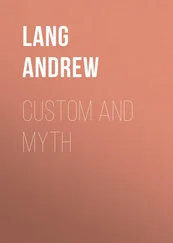Andrew Lang - A Monk of Fife
Здесь есть возможность читать онлайн «Andrew Lang - A Monk of Fife» — ознакомительный отрывок электронной книги совершенно бесплатно, а после прочтения отрывка купить полную версию. В некоторых случаях можно слушать аудио, скачать через торрент в формате fb2 и присутствует краткое содержание. Жанр: foreign_antique, foreign_prose, на английском языке. Описание произведения, (предисловие) а так же отзывы посетителей доступны на портале библиотеки ЛибКат.
- Название:A Monk of Fife
- Автор:
- Жанр:
- Год:неизвестен
- ISBN:нет данных
- Рейтинг книги:3 / 5. Голосов: 1
-
Избранное:Добавить в избранное
- Отзывы:
-
Ваша оценка:
- 60
- 1
- 2
- 3
- 4
- 5
A Monk of Fife: краткое содержание, описание и аннотация
Предлагаем к чтению аннотацию, описание, краткое содержание или предисловие (зависит от того, что написал сам автор книги «A Monk of Fife»). Если вы не нашли необходимую информацию о книге — напишите в комментариях, мы постараемся отыскать её.
A Monk of Fife — читать онлайн ознакомительный отрывок
Ниже представлен текст книги, разбитый по страницам. Система сохранения места последней прочитанной страницы, позволяет с удобством читать онлайн бесплатно книгу «A Monk of Fife», без необходимости каждый раз заново искать на чём Вы остановились. Поставьте закладку, и сможете в любой момент перейти на страницу, на которой закончили чтение.
Интервал:
Закладка:
As this was in my mind, the first grey stole into the sky so that I could see the black branches overhead; and now there awoke the cries of birds, and soon the wood was full of their sweet jargoning. This put some hope into my heart; but the morning hours were long, and colder than the night, to one wet to the bone with the rains. Now, too, I comforted myself with believing that, arrive what might, I was wholly quit of Brother Thomas, whereat I rejoiced, like the man in the tale who had sold his soul to the Enemy, and yet, in the end, escaped his clutches by the aid of Holy Church. Death was better to me than life with Brother Thomas, who must assuredly have dragged me with him to the death that cannot die. Morning must bring travellers, and my groaning might lead them to my aid. And, indeed, foot-farers did come, and I did groan as well as I could, but, like the Levite in Scripture, they passed by on the other side of the way, fearing to meddle with one wounded perchance to the death, lest they might be charged with his slaying, if he died, or might anger his enemies, if he lived.
The light was now fully come, and some rays of the blessed sun fell upon me, whereon I said orisons within myself, commanding my case to the saints. Devoutly I prayed, that, if I escaped with life, I might be delivered from the fear of man, and namely of Brother Thomas. It were better for me to have died by his weapon at first, beside the broken bridge, than to have lived his slave, going in dread of him, with a slave’s hatred in my heart. So now I prayed for spirit enough to defend my honour and that of my country, which I had borne to hear reviled without striking a blow for it. Never again might I dree this extreme shame and dishonour. On this head I addressed myself, as was fitting, to the holy Apostle St. Andrew, our patron, to whom is especially dear the honour of Scotland.
Then, as if he and the other saints had listened to me, I heard sounds of horses’ hoofs, coming up the road from Chinon way, and also voices. These, like the others of the night before, came nearer, and I heard a woman’s voice gaily singing. And then awoke such joy in my heart as never was there before, and this was far the gladdest voice that ever yet I heard, for, behold, it was the speech of my own country, and the tune I knew and the words.
“O, we maun part this love, Willie,
That has been lang between;
There’s a French lord coming over sea
To wed me wi’ a ring;
There’s a French lord coming o’er the sea
To wed and take me hame!”
“And who shall the French lord be, Elliot?” came another voice, a man’s this time, “though he need not cross the sea for you, the worse the luck. Is it young Pothon de Xaintrailles? Faith, he comes often enough to see how his new penoncel fares in my hands, and seems right curious in painting.”
It may be deemed strange that, even in this hour, I conceived in my heart a great mislike of this young French lord, how unjustly I soon well understood.
“O, nae French lord for me, father,
O, nae French lord for me,
But I’ll ware my heart on a true-born Scot,
And wi’ him I’ll cross the sea.”
“Oh, father, lo you, I can make as well as sing, for that is no word of the old ballant, but just came on to my tongue!”
They were now right close to me, and, half in fear, half in hope, I began to stir and rustle in the grass, for of my stifled groaning had hitherto come no profit. Then I heard the horses stop.
“What stirring is that in the wood, father? I am afraid,” came the girl’s voice.
“Belike a fox shifting his lair. Push on, Maid Elliot.” The horses advanced, when, by the blessing of the saints, the jackanapes woke in my breast.
The creature was used to run questing with a little wooden bowl he carried for largesse, to beg of horsemen for his mistress. This trick of his he did now, hearing the horses’ tramp. He leaped the ditch, and I suppose he ran in front of the steeds, shaking his little bowl, as was his wont.
“Oh, father,” sounded the girl’s voice, “see the little jackanapes! Some travelling body has lost him. Let me jump down and catch him. Look, he has a little coat on, made like a herald’s tabard, and wears the colours of France. Here, hold my reins.”
“No, lass. Who can tell where, or who, his owner is? Take you my reins, and I will bring you the beast.”
I heard him heavily dismount.
“It will not let itself be caught by a lame man,” he said; and he scrambled up the ditch bank, while the jackanapes fled to me, and then ran forward again, back and forth.
“Nom Dieu, whom have we here?” cried the man, in French.
I turned, and made such a sound with my mouth as I might, while the jackanapes nestled to my breast.
“Why do ye not speak, man?” he said again; and I turned my eyes on him, looking as pitifully as might be out of my blood-bedabbled face.
He was a burly man, great of growth, with fresh red cheeks, blue eyes, reddish hair, and a red beard, such as are many in the Border marches of my own country, the saints bless them for true men! Withal he dragged his leg in walking, which he did with difficulty and much carefulness. He “hirpled,” as we say, towards me very warily; then, seeing the rope bound about me, and the cloth in my mouth, he drew his dagger, but not to cut my bonds. He was over canny for that, but he slit the string that kept the cursed gag in my mouth, and picked it out with his dagger point; and, oh the blessed taste of that first long draught of air, I cannot set it down in words! “What, in the name of all the saints, make you here, in this guise?” he asked in French, but with a rude Border accent.
“I am a kindly Scot,” I said in our own tongue, “of your own country. Give me water.” And then a dwawm, as we call it, or fainting-fit, came over me.
When I knew myself again, I was lying with my head in a maiden’s lap, and well I could have believed that the fairies had carried me to their own land, as has befallen many, whereof some have returned to earth with the tale, and some go yet in that unearthly company.
“Gentle demoiselle, are you the gracious Queen of Faerie?” I asked, as one half-wakened, not knowing what I said. Indeed this lady was clad all in the fairy green, and her eyes were as blue as the sky above her head, and the long yellow locks on her shoulders were shining like the sun.
“Father, he is not dead,” she said, laughing as sweet as all the singing-birds in March – “he is not dead, but sorely wandering in his mind when he takes Elliot Hume for the Fairy Queen.”
“Faith, he might have made a worse guess,” cried the man. “But now, sir, now that your bonds are cut, I see nothing better for you than a well-washed face, for, indeed, you are by ordinary ‘kenspeckle,’ and no company for maids.”
With that he brought some water from the burn by the road, and therewith he wiped my face, first giving me to drink. When I had drunk, the maid whom he called Elliot got up, her face very rosy, and they set my back against a tree, which I was right sorry for, as indeed I was now clean out of fairyland and back in this troublesome world. The horses stood by us, tethered to trees, and browsed on the budding branches.
“And now, maybe,” he said, speaking in the kindly Scots, that was like music in my ear – “now, maybe, you will tell us who you are, and how you came into this jeopardy.”
I told him, shortly, that I was a Scot of Fife; whereto he answered that my speech was strangely English. On this matter I satisfied him with the truth, namely, that my mother was of England. I gave my name but not that of our lands, and showed him how I had been wandering north, to take service with the Dauphin, when I was set upon, and robbed and bound by thieves, for I had no clearness as to telling him all my tale, and no desire to claim acquaintance with Brother Thomas.
Читать дальшеИнтервал:
Закладка:
Похожие книги на «A Monk of Fife»
Представляем Вашему вниманию похожие книги на «A Monk of Fife» списком для выбора. Мы отобрали схожую по названию и смыслу литературу в надежде предоставить читателям больше вариантов отыскать новые, интересные, ещё непрочитанные произведения.
Обсуждение, отзывы о книге «A Monk of Fife» и просто собственные мнения читателей. Оставьте ваши комментарии, напишите, что Вы думаете о произведении, его смысле или главных героях. Укажите что конкретно понравилось, а что нет, и почему Вы так считаете.












